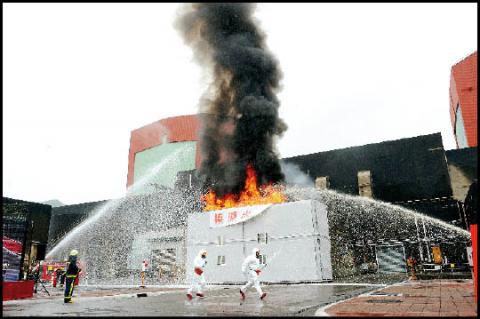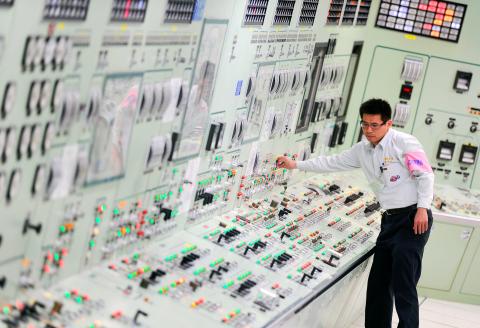Taiwan held its first compounded nuclear disaster drill yesterday, with President Ma Ying-jeou (馬英九) looking on as emergency responders shifted into gear at the Guosheng Nuclear Power Plant in Wanli District (萬里), New Taipei City (新北市).
The exercise, organized by Taiwan Power Co (Taipower) and the New Taipei City Fire Department, also involved staff at the nuclear plant.
The scenario of the drill was based on the Fukushima Dai-ichi nuclear crisis that has haunted Japan since March 11, the day a magnitude 9.0 earthquake and ensuing tsunami devastated the country’s northeast.

Photo: Chang Chia-ming, Taipei Times
The exercise presumed a magnitude 8 earthquake at a depth of 10km, with the epicenter located 342km northeast of the plant. A tsunami between 15m and 20m in height was assumed to have hit the coast.
Taipower officials said that in the worst-case scenario of a total power outage at the plant, they would make saving lives the top priority by abandoning the plant and injecting seawater to prevent a meltdown of the nuclear core.
The scenario included a fire alarm system that broke down after the earthquake, cascading power failures, as well as malfunctions in the reactor and the cooling pool for spent fuel, resulting in overheating fuel rods, which can cause a hydrogen explosion and excessive radiation leakage.

Photo: Sam Yeh, AFP
White foam was sprayed from fire trucks to put out a fire while responders in radiation protection suits assessed radiation levels near the site.
Following the fire simulation, responders demonstrated how water would be injected into the reactor and cooling pool by using fire trucks.
Although Taiwan’s geological environment is not the same as Japan’s, firm precautionary measures need to be in place, Ma said, adding that regular practice was needed to ensure proper and timely response to earthquakes.
“In the short term, Taiwan cannot be without nuclear energy. As such, nuclear safety must be our priority,” he said.
Ma gave the first day of the exercise a very positive grade. The drill continues today, this time with a focus on evacuation and temporary accommodation of nearby residents.

Taiwan is to commence mass production of the Tien Kung (天弓, “Sky Bow”) III, IV and V missiles by the second quarter of this year if the legislature approves the government’s NT$1.25 trillion (US$39.78 billion) special defense budget, an official said yesterday. Commenting on condition of anonymity, a defense official with knowledge of the matter said that the advanced systems are expected to provide crucial capabilities against ballistic and cruise missiles for the proposed “T-Dome,” an advanced, multi-layered air defense network. The Tien Kung III is an air defense missile with a maximum interception altitude of 35km. The Tien Kung IV and V

The disruption of 941 flights in and out of Taiwan due to China’s large-scale military exercises was no accident, but rather the result of a “quasi-blockade” used to simulate creating the air and sea routes needed for an amphibious landing, a military expert said. The disruptions occurred on Tuesday and lasted about 10 hours as China conducted live-fire drills in the Taiwan Strait. The Civil Aviation Administration (CAA) said the exercises affected 857 international flights and 84 domestic flights, affecting more than 100,000 travelers. Su Tzu-yun (蘇紫雲), a research fellow at the government-sponsored Institute for National Defense and Security Research, said the air

Taiwan lacks effective and cost-efficient armaments to intercept rockets, making the planned “T-Dome” interception system necessary, two experts said on Tuesday. The concerns were raised after China’s military fired two waves of rockets during live-fire drills around Taiwan on Tuesday, part of two-day exercises code-named “Justice Mission 2025.” The first wave involved 17 rockets launched at 9am from Pingtan in China’s Fujian Province, according to Lieutenant General Hsieh Jih-sheng (謝日升) of the Office of the Deputy Chief of the General Staff for Intelligence at the Ministry of National Defense. Those rockets landed 70 nautical miles (129.6km) northeast of Keelung without flying over Taiwan,

A strong continental cold air mass is to bring pollutants to Taiwan from tomorrow, the Ministry of Environment said today, as it issued an “orange” air quality alert for most of the country. All of Taiwan except for Hualien and Taitung counties is to be under an “orange” air quality alert tomorrow, indicating air quality that is unhealthy for sensitive groups. In China, areas from Shandong to Shanghai have been enveloped in haze since Saturday, the ministry said in a news release. Yesterday, hourly concentrations of PM2.5 in these areas ranged from 65 to 160 micrograms per cubic meter (mg/m³), and pollutants were